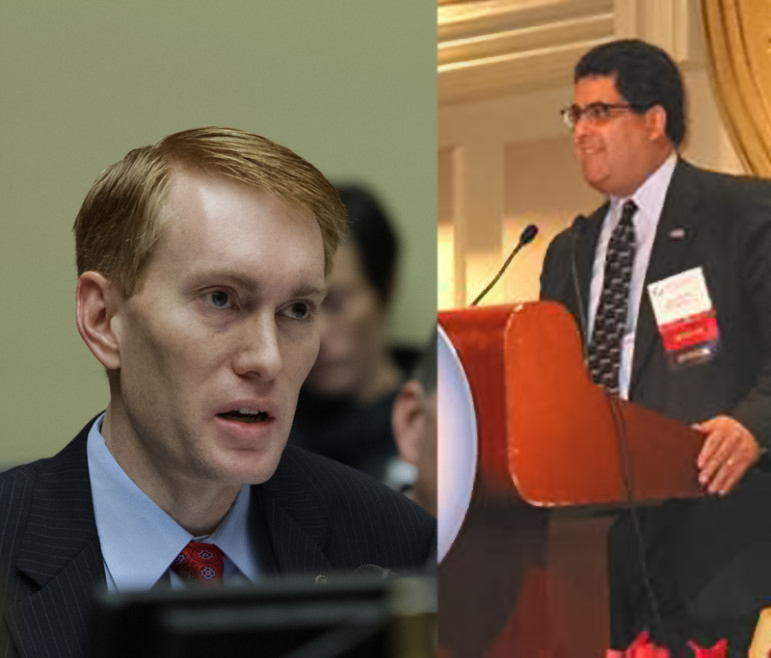
U.S. Rep. James Lankford, (R-Okla.)
Six years after a grant-awarding controversy shook up the federal Office of Juvenile Justice and Delinquency Prevention — resulting in a congressional hearing, an audit of the Justice Department’s Inspector General (OIG), the firing of the administrator’s chief of staff and the administrator’s own resignation months later — the legal mechanism that allowed such practices to take place has not changed.
In the events of 2008, former OJJDP Administrator J. Robert Flores faced criticism following a Youth Today investigation that found that he awarded grants to organizations that didn’t score as high in merit as other applicants that didn’t get the grants.
In the final Inspector General’s report issued a year later, the OIG also found that unrelated to Flores’ actions, his superior, former Assistant Attorney General Regina Schofield, told him to set aside 65 percent of the available discretionary funds, or $74 million, to award to 17 invited applicants without competition.
Although the report said Flores and Schofield “did not necessarily violate grant-making rules,” the OIG was concerned about the lack of evidence showing the reasons for their decisions.
The Inspector General then gave nine recommendations to improve transparency, including urging OJJDP to disclose which grants were awarded through a competitive process and which were not. The Inspector General also suggested that agency heads keep a record justifying their rationale for soliciting non-competitive invited awards and approving awards that deviate significantly from peer review results.
But not one of the recommendations actually prevents future agency heads from continuing to award grants outside the competitive and merit-based process.
Current OJJDP Administrator Robert L. Listenbee declined to be interviewed for this article, but he gave the Juvenile Justice Information Exchange a written statement that the OIG report was closed in 2010 after the Office of Justice Programs responded to the recommendations.
“As a result, OJP and the Office of Juvenile Justice and Delinquency Prevention have strengthened existing internal controls and review processes already in place to ensure greater transparency and documentation for all selection and award decisions,” Listenbee said.
Although the agency now labels which awarded grants were given competitively and which were not, every grant solicitation still includes language that says final award decisions are determined by the OJJDP Administrator or the Assistant Attorney General of OJP who can consider factors including underserved populations, geographic diversity, strategic priorities, past performance and available funding.
Additionally, the OIG recommendation that agency heads should keep a record of their justifications for granting invited awards and awarding winners that deviate from peer review scores does not include any public disclosure of these records.
All this frustrates Scott Peterson, a former OJJDP program manager who now runs Global Youth Justice, a company that works with juvenile justice groups. Peterson believes that the only legitimate cause to look beyond the merits of a grant is whether the recipient has committed waste, fraud or abuse.
“No scores are released, and no rankings are released, and no names of applicants are released, and there is no public justification if they do not follow scores and rankings,” Peterson says. “They awarded more than a dozen research grants last year worth millions and millions that were not competitively awarded. It is all in the dark still.”
Current Practice
Many argue that this administrative leeway is important as there can be factors that come into play that aren’t part of the merit-based application.
Former OJJDP Administrator, and Flores’ predecessor, Shay Bilchik was unable to speak to JJIE before publication of this article, but he told Youth Today in 2008 that an agency may want to achieve geographic variety among grantees, or may take into account the applicant’s performance on previous grants. If this happened under his tenure, they would issue decision memos about the grants, he said.
Flores had argued that in addition to the peer rankings he also considered presidential initiatives, which had included working with faith-based organizations. He also said he made his decision after viewing all 104 grant proposals, although peer reviewers only studied a few each. Flores also said he considered whether the department was currently funding similar projects or whether the applicants got funds through other grants.
[module type=”aside” align=”right”]Related stories on Youth Today:
- For Juvenile Justice, A Panel of One
- Former Justice Official Says Juvenile Chief Misled Her
- Justice Department Investigates Travel by Flores
- OJJDP Chief Flores Testifies Before Waxman’s Panel
- In Defense of Flores
- The Case Against Flores
- Justice Official Fired; Bypassed Grant Deadlines
- Senate Launches Probe of Juvenile Justice
- Bill Would Force Action at OJJDP
- OIG Report Finds Flores Violated Ethics Rules
Schofield told the OIG that she decided to use invited awards to provide necessary funding for programs that had received earmarks in prior years and that some of the invited awards were given after the DOJ, the White House and Congress asked that certain organizations receive OJJDP grants.
The report reads: “For example, Schofield told us that officials with the Office of the Attorney General requested that OJP support a youth program proposed by the National Football Foundation.”
The public would be more likely to accept the rationale of administrative decisions if the agency simply disclosed the applications of grant winners and their scores, argues Peterson, of Global Youth Justice.
A 2012 Congressional Research Service report also noted that this lack of transparency existed for all federal grants and even noted that some of the factors used in formula grants are not publicly available either.
“Without greater transparency into these processes, it is difficult for Congress to measure the effectiveness of federal grant allocation formulas or to determine whether there has been fair competition in the awarding of federal grants,” the report said.
A Solution
U.S. Rep. James Lankford, (R-Okla.), hopes to change the way grants are currently disclosed. Last fall he introduced the Grant Reform and New Transparency Act of 2013 or GRANT Act, which calls for agencies to post information about each grant opportunity, a copy of a successful grant abstract or application, award decisions including rankings and the name or a unique identifier of peer reviewers, and a final performance report at the end of the grant.
The bill would protect national security and some proprietary information by not requiring agencies to post information that would otherwise be exempt under the Freedom of Information Act, Lankford’s office says.
Under the proposal, agencies will also be required to screen potential grantees to ensure they’re capable of performing the grant. The bill also offers those that lost out on grants valued at more than $100,000 the chance to request a debriefing with the agency, which the agency must provide.
The bill doesn’t address invited awards, which are still very much a part of the OJJDP grant process however. In 2013 alone, the agency awarded about $106 million through invited grants, according to a recent JJIE report. Lankford said he wasn’t aware of invited awards, but said it didn’t sound fair.
“This is a competitive merit-based process and we want that criteria to be clearly known in advance,” Lankford says. “The bill provides everyone with the opportunity to know how their federal tax dollars are being used.”
The aim is to help groups that are doing well but can’t seem to break into and be successful at the grant process to learn why they failed and how they can do better next time, Lankford says. And it will also shed light on the very small group of well-connected people that get grants all the time, he adds.
The bill was amended and approved by the House Oversight Committee to add some protections for peer reviewers and intellectual property issues, Lankford says. The congressman introduced a similar bill in the last legislative session but it never got to a House vote. At that time, it faced opposition from academic groups concerned that it could jeopardize intellectual property rights and reveal proprietary information. They also objected to revealing names or unique identifiers of peer reviewers as many research areas have a small pool of potential reviewers that can be easily identified.
So far, his bill is still very much alive, Lankford says, adding that he’s gotten bipartisan support for it and it’s awaiting a House vote.
“This is not only a Republican issue, Democrats are very open to transparency,” he says.
Financial supporters of Youth Today may be quoted or mentioned in our stories. They may also be the subjects of our stories.



























